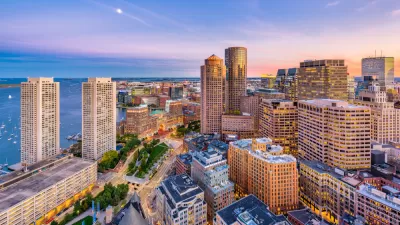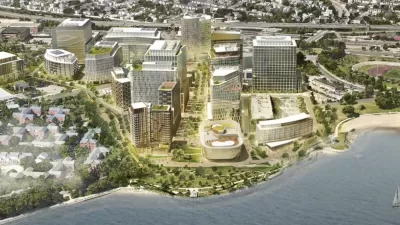The Boston Globe explores the YIMBY (Yes In My Backyard) movement, as debate over a retail project in East Boston gains pro-development interest.
"Turns out, there are people who actually want development in their backyard," writes Katheleen Conti. "These aren’t the complainers known for crying NIMBY — not in my backyard. These folks want to say yes to new building projects."
Conti examines the debate surrounding a development proposal in East Boston, currently a two-story, 26,000-square-foot retail complex developed by Burlington-based Linear Retail Properties LLC.
"The [YIMBY] residents are pushing to come up with something more ambitious than it’s proposed for a site now occupied by a former funeral home and three vacant buildings. The development, steps from the MBTA’s Maverick Blue Line station, would include a restaurant, shops, and a fitness center."
FULL STORY: Not NIMBY, but YIMBY: opponents say East Boston retail project is too small

Alabama: Trump Terminates Settlements for Black Communities Harmed By Raw Sewage
Trump deemed the landmark civil rights agreement “illegal DEI and environmental justice policy.”

Planetizen Federal Action Tracker
A weekly monitor of how Trump’s orders and actions are impacting planners and planning in America.

The 120 Year Old Tiny Home Villages That Sheltered San Francisco’s Earthquake Refugees
More than a century ago, San Francisco mobilized to house thousands of residents displaced by the 1906 earthquake. Could their strategy offer a model for the present?

Ken Jennings Launches Transit Web Series
The Jeopardy champ wants you to ride public transit.

BLM To Rescind Public Lands Rule
The change will downgrade conservation, once again putting federal land at risk for mining and other extractive uses.

Indy Neighborhood Group Builds Temporary Multi-Use Path
Community members, aided in part by funding from the city, repurposed a vehicle lane to create a protected bike and pedestrian path for the summer season.
Urban Design for Planners 1: Software Tools
This six-course series explores essential urban design concepts using open source software and equips planners with the tools they need to participate fully in the urban design process.
Planning for Universal Design
Learn the tools for implementing Universal Design in planning regulations.
Clanton & Associates, Inc.
Jessamine County Fiscal Court
Institute for Housing and Urban Development Studies (IHS)
City of Grandview
Harvard GSD Executive Education
Toledo-Lucas County Plan Commissions
Salt Lake City
NYU Wagner Graduate School of Public Service





























